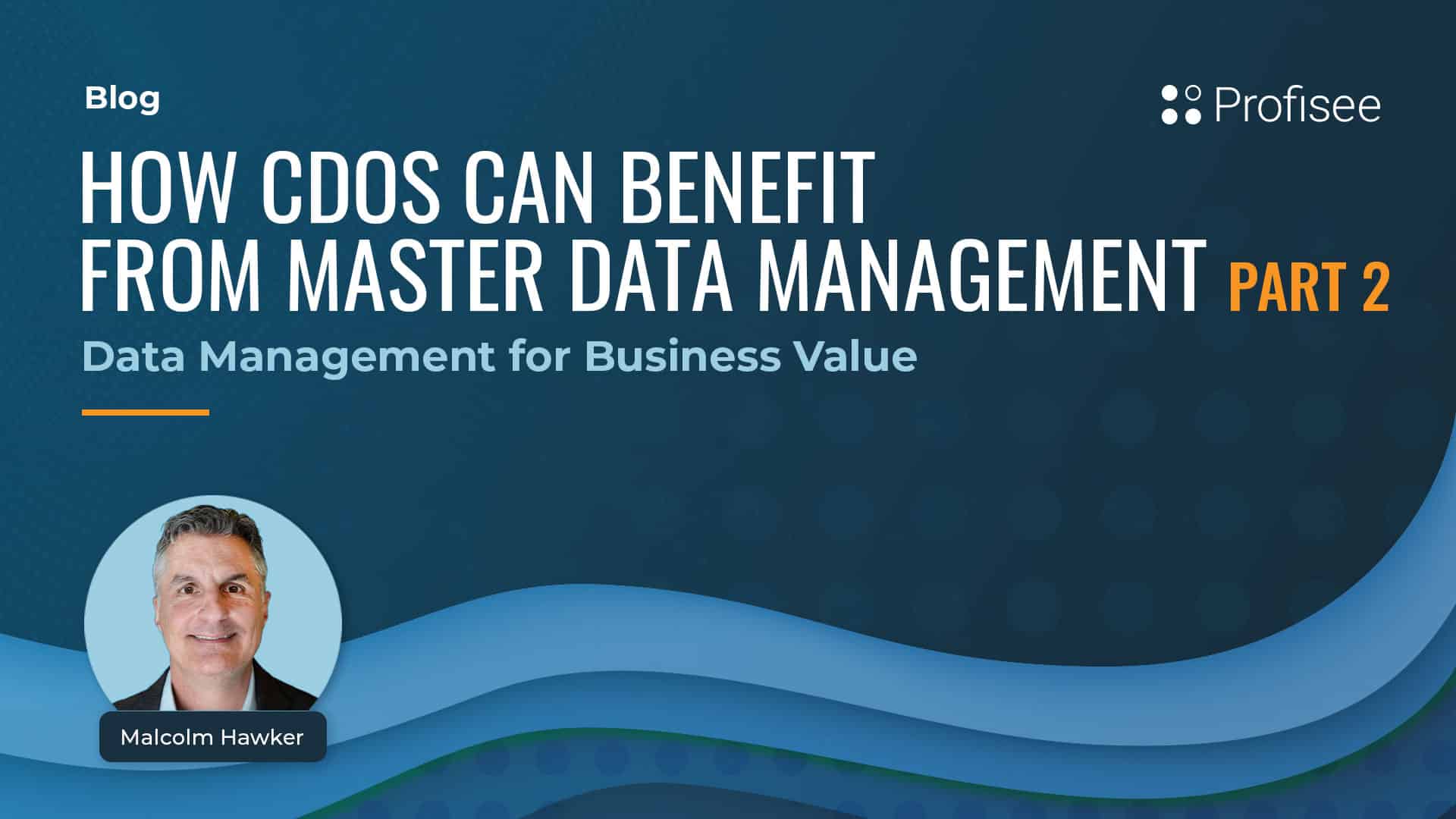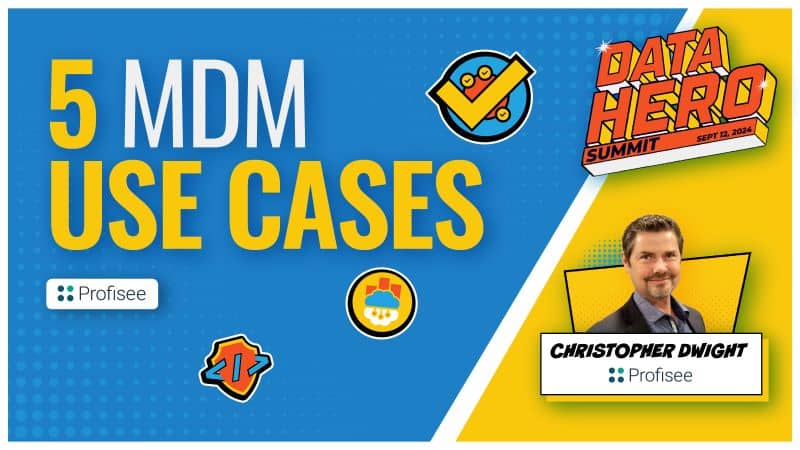As discussed in the first part of our series, companies must start any master data management (MDM) implementation by defining their digital transformation process. Now, they must evaluate the actual business value that MDM brings to their business. When chief data officers (CDOs) consider the benefits of MDM for their organization, they need to approach it from a business perspective instead of a from a purely data-driven perspective.
Yes, the data has problems, and MDM is needed to enhance an enterprise’s data quality. CDOs know that their critical data will be cleaned, unified and improved going in. But they also know, crucially, that business stakeholders do not necessarily care as much about what MDM can do for data quality as they do about the business value that MDM provides.
When beginning your MDM implementation, you need to also understand the long-term effects on the business itself. It is important for companies to ask if MDM provides them with operational and financial opportunities. This can only be confirmed by determining business value.
Enabling Business Outcomes with Master Data Management
MDM cannot serve a CDO-centric purpose without supplying a certain degree of business enablement. At the end of the day, an MDM platform must positively impact an organization’s ability to conduct business. This means improving both the operational workflow and the customer experience to maximize customer satisfaction and increase revenue.
CDOs want to support their businesses’ efforts to keep current customers while attracting new ones. A successful MDM implementation requires a measurable improvement in customer engagement and, ideally, incremental revenue to justify the investment.
That’s why it is critical to tie the strength of a business’s foundational data to the business outcomes that matter to leadership.
A company can have the cleanest and most accurate master data in the world, but if they are not leveraging this enhanced information, then it is of no use to the business.
Clean data provides businesses with a chance to create new profitable opportunities and significant business value, not the other way around. A CDO needs to remain focused on the endgame when considering the many benefits MDM can bring to their organization.
Master Data Management: Features vs. Outcomes
A major component of fully realizing MDM’s benefits to CDOs is understanding the difference between the features of MDM as a practice and the business outcomes that are produced as a result.
It is easy to mix up the two, but tools are not the same as an outcome and vice versa. For example, the tool is what you use to get you to a particular goal or outcome.
For example, MDM allows a business to do several things with their critical data, but it is up to the organization to determine how to leverage the data and reach a specific outcome. By differentiating the two, a CDO can then pinpoint the exact outcome(s) they wish to achieve through an implementation. In doing this, it is important to break down common tools and outcomes associated with MDM.
The common tools and features of MDM include:
Enhanced Data Quality
Ensuring the data is clean, accurate, consistent, harmonized and able to seamlessly communicate with other data across multiple systems.
Better Decisions
With more accurate and consistent data comes stronger and clearer insights for necessary decision-making.
Single Version of the Truth
A singular, unified source of trustworthy data a business can draw from when leveraging critical information to grow their business.
360-Degree View of the Customer
A complete and unified view of all customer data that leads to future potential transactions and increased revenue opportunities.
Once these MDM tools and features listed above are applied to fully leverage the data, then an enterprise can utilize it to attain business outcomes. This is where the core value of MDM comes into play for a CDO.
Some of the common business outcomes that result from MDM include:
Cross-selling / Upselling
Increasing or enhancing sales opportunities with a customer based on the number of sales or the purchase amount of a particular transaction based on a stronger view of customer data.
Strategic Marketing
With accurate and consistent customer and geographic data come more effective and directed marketing endeavors with the ideal profile of consumers who are more likely to conduct business.
Improved Shipping / Production
When geographic data is accurate, consistent and trustworthy, a CDO has a better understanding of the amount of product that needs to be produced and where it needs to ship.
When it comes to MDM tools and business value, you cannot have one without the other. A CDO must understand the complete journey from start to finish. Reaping the benefits means knowing how to sow. To enjoy the harvest of substantial business value, they must know what they hope to accomplish and how MDM can get them there.
Taking the ‘Data’ Out of Master Data Management
At the end of the day, the CDO is the ultimate decision-maker when it comes to implementing an MDM platform for their organization. They favor the results over the journey that brings them there, and rightfully so.
Why invest in something that does not leave you with more than what you started with? It is crucial for a CDO to remain value-focused rather than data-driven when considering MDM. This defines the CDO mindset.
For this reason, a CDO should take on the personal challenge of explaining why they want to integrate MDM without using the word “data.” Focusing too strongly on what MDM does for critical enterprise data only draws attention away from the business value that inspired the consideration to invest in the first place.
With MDM being such a data-driven process that relies on enhancing data quality, it can seem nearly impossible. Therein lies the challenge!
Seriously, explain what MDM does for your business without explaining what it does for your data. Most organizations struggle with this challenge. However, it is an important exercise for evaluating long-term goals and intentions for growing the business.
Sometimes looking ahead can make the pathway leading there seem much clearer. Strong data management leads to strong management of products and sales. MDM is that smarter approach to data management required for desirable business outcomes. Without that, the ends do not justify the means.
How Profisee Can Help
As important as MDM is for creating trustworthy critical data, it is also crucial to select a vendor that provides a seamless deployment that easily pays for itself many times over. Without that, there is no business value.
At Profisee, we take a cloud-native approach to cleaning and unifying your critical data without wasting valuable time for your business.
As the ultimate MDM decision-maker, it is important for CDOs to understand the ins and outs of MDM and the value it can bring when delivering on your outcomes, goals and initiatives. In part three, we will be diving further into what it means to prioritize your business outcomes and manage the scope of your MDM implementation.

Malcolm Hawker
Head of Data Strategy @ Profisee

Malcolm Hawker
Malcolm Hawker is a former Gartner analyst and the Chief Data Officer at Profisee. Follow him on LinkedIn.











